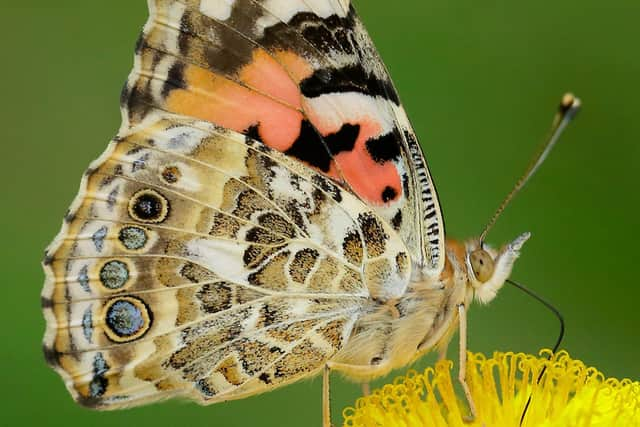How to rewild your garden to build up Yorkshire’s declining butterfly population
It’s a worrying reality that many of our native butterflies are in decline, as highlighted in a recent study of European species.
The research, published in the scientific journal PNAS, noted that overall numbers have declined by 50 per cent since 1976. Indeed, seven out of 10 British species of butterfly are declining, many of those very rapidly, and some which were previously common, including grass feeders such as small skipper, common blue, small blue, small copper and small heath, according to the charity Butterfly Conservation.
Advertisement
Hide AdAdvertisement
Hide AdConservationists believe that re-wilding your garden can go some way to stemming the decline, even in a small space. The charity’s director of conservation Dr Dan Hoare, co-author of the research paper, explains: “Going wild in your garden is absolutely the right approach.”


He recommends these six key steps to re-wilding your plot to help these beautiful insects thrive once more.
1. Let grass go wild
“Introduce small flower species to your lawn by letting your grass grow longer and wilder,” he suggests. “Put away the mower and let your lawn grow between April and July.”
He concedes that some gardeners who want a neater space will be reluctant to let their beloved lawn grow to huge proportions, but says you can do your bit by just leaving a smaller area untouched. Leaving the grass long provides space for the caterpillars of grass feeders like the speckled wood butterfly, meadow brown and gatekeeper.
2. Go native
Advertisement
Hide AdAdvertisement
Hide Ad“Get as many native plants which grow wild into your garden as you can,” says Hoare. “We have lists on our website you can choose from, but typical plants include bird’s-foot-trefoil, yarrow, clovers, trees and shrubs which are good nectar sources, such as willow and ivy, and blackthorn in your hedge, instead of leylandii or laurel.”
3. Don’t use pesticides
“Pretty obviously, pesticides are designed to kill insects,” he warns. “We are putting toxic chemicals all over our gardens, where we’re sitting having a picnic or playing with our kids. In most cases they’re just not needed. If you have a healthy ecosystem of insects visiting your garden it should keep the balance of nature going – wasps and ladybirds will eat the aphids,” he says.
4. Turn off your garden lights
“Light pollution is a huge problem for a whole range of wildlife including moths, bats and birds. There has been a huge proliferation in LED lights and solar lights which charge up in the day and stay on all night, when you’re not actually using the garden. Lighting at night disrupts the natural life cycles and rhythms of huge numbers of wildlife. Some butterflies migrate at night but it has more of an impact on moths.
“A lot of insects change their daily patterns of feeding, mating and migrating when they go into hibernation. All of those things are determined by the pattern of daylight.”
5. Share your efforts with neighbours
Advertisement
Hide AdAdvertisement
Hide Ad“Explain to your neighbours that you’re not neglecting your lawn, you’re re-wilding it. I put a little sign on my front gate to explain what we’re doing. I have kids so we painted a sign with bug pictures on it.”
6. Look beyond your garden gate
“Talk to your council about the way they are mowing their road verges, or talk to your neighbours to scale up. If you find what you’re doing in your garden is working, spread the message.”
Support The Yorkshire Post and become a subscriber today. Your subscription will help us to continue to bring quality news to the people of Yorkshire. In return, you’ll see fewer ads on site, get free access to our app and receive exclusive members-only offers. Click here to subscribe.
Comment Guidelines
National World encourages reader discussion on our stories. User feedback, insights and back-and-forth exchanges add a rich layer of context to reporting. Please review our Community Guidelines before commenting.